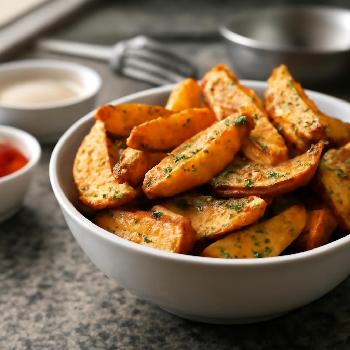Cooking Tips > Culinary Equipment > Specialty Equipment > Do I need an air fryer?
Do I need an air fryer?
Is an air fryer a worthwhile addition to your kitchen, or just another gadget taking up counter space? This guide explores the pros and cons of air fryers to help you decide if it's the right appliance for your cooking needs. We'll delve into its functionality, benefits, drawbacks, and alternative cooking methods.

Understanding the Air Fryer
An air fryer is essentially a countertop convection oven. It cooks food by circulating hot air around it at high speed, producing a crispy layer similar to deep frying but with significantly less oil. It typically uses a basket or tray to hold the food.
The Benefits of Using an Air Fryer
Healthier Cooking: Air fryers use significantly less oil than traditional frying, making them a healthier option for enjoying crispy foods. You can often achieve similar results with just a tablespoon or two of oil. Faster Cooking Times: Air fryers heat up quickly and cook food faster than conventional ovens, saving you time and energy. Ease of Use: Most air fryers are user-friendly with simple controls and preset cooking programs. Easy Cleanup: Air fryer baskets and trays are typically non-stick and dishwasher safe, making cleanup a breeze. Versatility: Beyond frying, air fryers can be used for roasting vegetables, baking small desserts, and reheating leftovers.
The Drawbacks of Using an Air Fryer
Counter Space: Air fryers can be bulky and take up valuable counter space, especially if you have a small kitchen. Capacity: Most air fryers have a limited capacity, which can be challenging when cooking for larger groups. Learning Curve: While generally easy to use, it may take some experimentation to find the optimal cooking times and temperatures for different foods in your specific air fryer. Overcrowding can also affect cooking performance. Texture Differences: The texture achieved in an air fryer is not exactly the same as deep frying. While crispy, it may lack the characteristic oiliness and richness of traditionally fried foods.
Alternatives to Air Frying
If you're hesitant to invest in an air fryer, consider these alternatives: Convection Oven: A convection oven can achieve similar results to an air fryer, though it may take longer and require slightly more oil. Oven Roasting: Roasting vegetables and other foods in the oven at a high temperature can produce a crispy exterior. Broiling: Broiling can be used to quickly brown and crisp the tops of foods.
Who Should Consider Buying an Air Fryer?
An air fryer is a good investment if: * You frequently cook frozen foods like fries, chicken nuggets, and mozzarella sticks. * You're looking for a healthier way to enjoy crispy foods. * You want to save time on cooking and cleanup. * You have limited oven space or prefer not to heat up your entire oven for small meals.
Who Might Not Need an Air Fryer?
You may not need an air fryer if: * You already have a convection oven. * You rarely cook frozen foods or fried foods. * You have limited counter space and aren't willing to sacrifice it. * You prefer the taste and texture of traditionally fried foods.
FAQ
-
What is the ideal cooking temperature for frozen french fries in an air fryer?
Generally, 400°F (200°C) for 12-15 minutes, shaking the basket halfway through. -
Can you use cooking spray in an air fryer?
It's generally recommended to avoid using aerosol cooking sprays in air fryers, as they can damage the non-stick coating. Instead, use a pump sprayer or lightly brush oil onto the food. -
What foods should you not cook in an air fryer?
Foods with wet batter (like tempura) or large roasts are generally not suitable for air frying. Cheese may melt and drip through the basket. Leafy greens will fly all over inside! -
How do I clean an air fryer?
Unplug the air fryer and let it cool completely. Remove the basket and pan and wash them with warm, soapy water. For stubborn food particles, soak them in hot water first. Wipe down the inside of the air fryer with a damp cloth.
